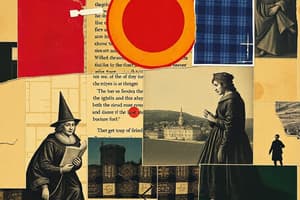Podcast
Questions and Answers
What was the result of the amalgamation of Normans and enslaved Saxons with the fusion of their language?
What was the result of the amalgamation of Normans and enslaved Saxons with the fusion of their language?
- The creation of Saxon language
- The creation of Latin language
- The creation of English language (correct)
- The creation of French language
What is the name of the oldest surviving text in English, written in the 7th century?
What is the name of the oldest surviving text in English, written in the 7th century?
- Beowulf
- De Nugis Curialium
- Ecclesiestical History of England
- Caedmon's hymn (correct)
Who wrote stories of King Arthur?
Who wrote stories of King Arthur?
- Walter Map (correct)
- Caedmon
- Aldhelm
- Bede
Which of the following is NOT a category of Anglo Norman literature?
Which of the following is NOT a category of Anglo Norman literature?
What dialect of Old English became the standard due to the political supremacy of Wessex?
What dialect of Old English became the standard due to the political supremacy of Wessex?
Who wrote the Brut d'Angleterre, a versified history of Britons?
Who wrote the Brut d'Angleterre, a versified history of Britons?
How many surviving manuscripts are considered major?
How many surviving manuscripts are considered major?
What is a characteristic of most Old English poems?
What is a characteristic of most Old English poems?
What is notable about the poetry of Cynewulf?
What is notable about the poetry of Cynewulf?
How many manuscripts of Old English poetry have survived?
How many manuscripts of Old English poetry have survived?
Flashcards are hidden until you start studying
Study Notes
Pre-Chaucerian Age
- Pre-Chaucerian literature is divided into two main parts: Anglo-Saxon and Anglo-Norman.
Anglo-Saxon Literature
- Until the 5th century, Briton and Celtic were settled in Britain and were Christianized by the Romans.
- Engle land (Germanie) settled in Northumbria, and Saxons (Scandinavian and Icelanders) and Jutes invaded the south-east part of Britain.
- Their tales and inspirations marked the spirit of paganism, relating to the contest between savage men and god warfare.
- The most influential poem of that age is Beowulf, which is 6000 lines long and truly represents the pagan spirit of that age.
- In prose, Aldhelm's Book of Riddles and Bede wrote many treaties, including the valuable Ecclesiastical History of England.
- Alcuin also wrote treaties, letters, and a few poems.
- The Anglo-Saxon Chronicle is a collection of early English history.
- Caedmon's Hymn (7th century) is one of the oldest surviving texts in English.
- There are 400 surviving manuscripts, 189 of which are considered major.
- Major locations for Anglo-Saxon literature include Winchester, Exeter, Worcester, Abingdon, Durham, and two Canterbury houses: Christ Church and St. Augustine.
Anglo-Norman Literature
- The Anglo-Norman era starts with the French conquest of Britain in 1066.
- For nearly three hundred years, the amalgamation of Normans and enslaved Saxons with the fusion of their languages resulted in the creation of English.
- Anglo-Norman literature can be divided into three categories: Latin writings of monks and historians, Norman French, and Semi-Saxon.
Latin Writings
- Walter Map wrote stories of King Arthur, De Nugis Curialium.
- Geoffrey of Monmouth wrote History of Britons, preserving the tales of King Arthur.
- Ralph Higden wrote 24 miracle plays titled as Chester Plays and Polychronicon in 7 books.
Norman French
- Wace wrote Brut d'Angleterre, a versified history of Britons.
Semi-Saxon
- Layamon wrote the Brutes, a superior translation and enlargement of Wace's poem.
- Orm or Ormin wrote Ormulum.
- Romances in poetry by Nicholas of Guildford were written.
Literary Features
- Most of the poems of this period have pagan features.
- All poems have anonymous writers, except for Caedmon and Cynewulf, who signed their poems in runic letters.
- Much of the prose and some of the poetry is translated from Latin.
- Whatever portion of old English poetry has survived, survived through manuscripts.
- There are four major manuscripts: the Beowulf, the Junius, the Exeter book, and the Vercelli book.
Language
- There were four main dialects: Northumbrian, Mercian, Kentish, and West Saxon.
- Due to the political supremacy of Wessex, West Saxon became the standard, and all extant texts were preserved in it.
Studying That Suits You
Use AI to generate personalized quizzes and flashcards to suit your learning preferences.


